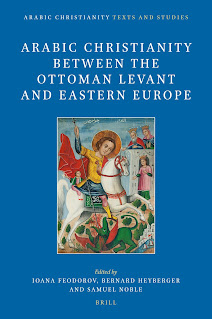The Arabic original is from here.The Feast of the Cross
On the fourteenth of September the churches celebrate the Elevation of the Cross. It goes without saying that Christians do not worship the wood of the Cross, and they only put it in their churches when there is an icon, that is a drawing, of Christ on it. Every mention of the Cross during worship brings us back to the one who died on it. Why do we have this feast? There are two types of Christian feasts: Feasts of concepts, like the Nativity and Easter, and feasts celebrating historical events to which a theological concept has been attached.
What we call the Elevation of the Cross commemorates first of all the discovery of the Savior’s Cross buried under the ground of Golgotha where he died. It was discovered by Helene, mother of the Emperor Constantine, who built the Church of the Resurrection and the Church of the Cradle. The wood of the Cross was placed in the Church of the Resurrection until May 4, when the Persians stole it during the time following their occupation of Jerusalem. In 628, after defeating the Persians the Emperor Heraclius returned it to the Holy City. The Church elevated the Cross before the faithful, and the feast began. The Cross was divided into very tiny pieces and was distributed to believers throughout world, meaning that today it is mere relics for thousands of Christians.
The liturgical aspect of this feast is extremely beautiful in the Orthodox tradition. Before the liturgy, the priest raises the Cross above his head and lowers it to the ground five times, amidst lengthy chanting. After each believer kisses the cross, the priest gives him a flower that had been placed around the Cross while it was carried in the procession that brought it to the table where the veneration takes place.
With varying levels of liturgical pomp and splendor, all Christians express their faith, not only with words and hymns, but also with symbols, to the point that it could be said that eastern liturgy is a kind of religious theater in which there are various art forms, prostrations, bows, and motions such as making the sign of the cross over the face and chest. In worship there is also water, bread, wine, oil, flowers, crowns for the bride and groom, oil and soil for a corpse, and robes of different colors according to the season, robes particular to each rank of clergy, icons and wall paintings, so that the faithful feel that they are giving glory to God with their souls and their bodies together—this is because of their belief in the resurrection of the body.
There is a necessary tangible quality that you have to know in order to understand Christianity as it was embodied in the first millennium—and everything we do today existed in the first millennium. You should understand people as they understand themselves.
You can accept Christ’s death or you can reject it, I won’t debate you. However, if you want to coexist with Christians, you have to understand their profound faith in the Crucified One. You will not understand a single speck of their faith and you will not be able to love them unless you understand their secret, namely what profoundly motivates them, and you remain free to believe or disbelieve in the event of the crucifixion. All the warmth of love in Christianity has only come to them through the crucifixion of the Savior. All their prayer, the purity of some of them, their intellectual achievements east and west, the testimony of millions of martyrs, generation after generation, their abstinence and asceticism, all forgiveness and peace in the soul and loves that sacrifice to the point of death, all of this comes down to them from the Crucified One. If it were not for him, then Christianity would be just another Jewish sect.
There is nothing in their Gospel apart from this event, whatever the language or styles of the Gospels. Their language appears simple but their theological content is extremely complicated. It is based on the dialectic of Christ’s death and resurrection, that is his glorious manifestation and his lordship over hearts.
This crucifixion is what makes Christianity a faith in a person named Jesus of Nazareth and not the basis for belief in books. The Nazarene did not write a single letter and his followers believe in him because he did and then rose. They wrote down the Gospels a few decades after his death (the fourth gospel after the year 90). Before they wrote them down, the single faith existed and the blood of the martyrs flowed not because of books but because of love for that person.
Through his passion, he became the high priest and took upon himself the sins of mankind in order to end them through the new life that he gives them through his entrance into the kingdom of death and his descent into hell, to the depth of the curse that affects all those who died before and after him. This is because “the wage of sin is death,” which became the death of the Son of Man.
These pains that he bore are the pains of all people, their transgressions. He took them upon himself in order to save them from them. “In baptism buried with him to death so that just as Christ was raised from the dead, we too can walk in renewal of life.”
However, before you receive eternal life, your condition is that of fallen, suffering man. This means that you too are crucified and you will not be saved from any cross that is put on your shoulders except through his cross and you will rise from the life you are in to his life so that you can become a new creation. You did not invent suffering. It comes from this world that is under the power of the evil one. It causes you pain and anxiety until Christ’s Resurrection falls upon you with repentance, which is you returning with all your wounds to his face. This is perfect faith, which spurs you on to hope and in love for Jesus, which it pours bountifully upon you so that you go to him and become a Paschal being.
“Let him who wants to follow me deny himself, take up his cross, and follow me.” Christ does not put a cross on you. It comes to you from the circumstances of your existence on earth. If you bear it, you will become a heavenly person. This is why the Feast of the Exaltation of the Cross has always been your path. Every day you are burdened and every day the Resurrection lifts your burdens from you.
From this vantage point, this feast extends through you every day. Do the children who light fires on the evening of this day know that they are thus called to carry light to the world, to become people of the Resurrection? Does that reflect their identity?
The Feast of the Exaltation of the Cross is nothing else but a love story, the greatest love story in history because it was written in blood. It is the marriage of the Savior with all humanity. His beloved is not limited to the Christian groups. It is purified mankind, from all corners of the earth. It is his body, that is his being, baptized in water or baptized in the Spirit. Those who believe in Jesus believe in love and all people are their beloved because all people come from Christ in one way or another and by his blood he carries them to his Father and his Spirit, so that God may be all in all.







